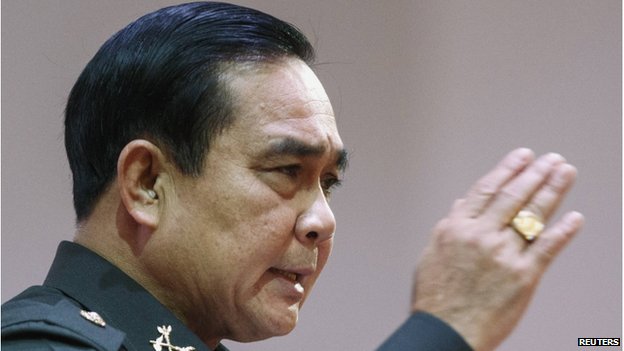Junta Leader Named New Thai Prime Minister
Prayuth Chan-ocha led the army in the May coup

Prayuth Chan-ocha, Thailand’s Junta leader, was named the country’s new Prime Minister on Thursday. The move followed months of political deadlock, as the coup in May that ousted the incumbent Prime Minister, Yingluck Shinawatra, marked the 12th coup in the South-east Asian nation’s history since the end of absolute monarchy in 1932.
For the relatively stable and democratic nation in comparison with neighboring states such as Cambodia and Vietnam whose development has been marred by conflict and autocracy, it is surprising that Thailand has had a dozen coups in the last 82 years. It is the military that has been instrumental in planning and executing these coups, which have often come at the cost of democratic freedoms such as the right to free speech and expression. In most cases, there have also been fatal clashes between the military and supporters of the incumbent governments at the time. However, the only constant in the midst of this political turmoil has been the power of the king, Adulyadej Bhumibol, whose role in Thai Politics has been unique as compared to other constitutional monarchs. As Duncan McCargo argued in his essay, ‘Network Monarchy and Legitimacy Crises in Thailand’, Thai politics can be best understood in terms of networks and the leading network from 1973 has been centered on the palace and is termed as ‘network monarchy.’
The concept of network monarchy suggests that the role of the king is characterized by active interventions in political processes achieving considerable influence in political circles but never accomplishing conditions for absolute domination. Moreover, in case of Thailand, these interventions and spheres of influence have been made possible through a network of proxies installed at the behest of the king, most notable of whom is Thailand’s former Prime Minister and President of the Privy Council, Prem Tinsulanond. Examples of the king playing a significant role as a political mediator, didactic commentator and decision maker are several- involvement in the ouster of political strongmen Thanom Kittikachorn and Praphas Charusathien in 1973, interventions in the bloody demonstrations of 1992 and the apparent involvement in the coup against Thaksin Shinawatra in 2006. What is interesting to note in the above examples is the fact that though the Privy Council or the military carried out these interventions and mediations, King Bhumibol was the guiding force behind them. As McCargo points out, “the royal family continued to display an excessive partiality for the military, rather than promoting reconciliation and unity. Nevertheless, the king eventually leaned an important lesson: network monarchy needed to assume the outward form of polyarchy, so as to coopt and incorporate a range of political actors.”
The recent pattern of events in Thailand is no different from the past. While the king is no longer as actively involved in politics due to fragile health, his support for the military has not diminished. In an open endorsement of the recent military takeover, King Bhumibol backed Thailand’s army chief General Prayuth Chan-ocha amidst widespread international criticism and increasing detention of those who are opposed to this takeover. The royal endorsement sponsored Chan-ocha as the head of the National Council for Peace and Order and ensured the people that elections would take place once the military had restored stability and peace to the nation. Not surprisingly, Chin-ocha too has been most critical of people who have been found disobeying the Lèse Majesté law-a law that forbids any form of defamation or insult of the Crown. Moreover, Yingluck Shinawatra is the sister of Thailand’s former Prime Minister Thaksin Shinawatra who openly criticized the manipulative role of King Bhumibol in Thai politics and sought to displace network monarchy with new networks of his own devising before he too was ousted by the military. Though Yingluck Shinawatra has not been as openly critical of the king or the military, her policies and actions were clearly not in the interest of network monarchy. While it is hard to definitively prove the direct involvement of the king in Yingluck’s coup, history of Thailand’s monarchy does provide some evident for the same. This coincidence was also noted by an article in the Washington Post titled ‘Behind Thailand’s coup is a fight over the king and his successor. But it’s hush-hush.’
The sudden suspension of civilian rule and the consequent fleeing of opponents of military rule into neighboring countries raises questions of Thailand’s democracy. Though it is unclear how the future will pan out for Thailand, the current events will certainly stain Thailand’s record for being a democratic nation. As Noam Chomsky commented on the freedom for speech and expression, ‘If we don’t believe in the freedom of expression for the people we despise, we don’t believe in it at all.’



